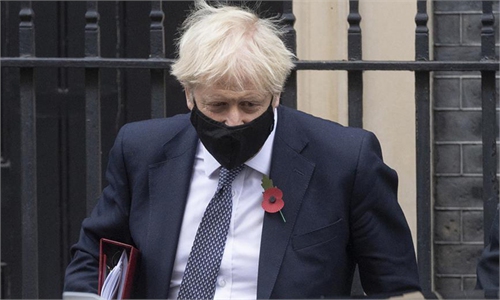EU starts to ease bans over virus strain discovered in UK
WHO to discuss response to new variant
Europe on Wednesday began lifting travel bans on Britain put in place to contain a new fast-spreading COVID-19 strain while experts from the World Health Organization were set to meet on a response to it.
The new coronavirus variant has swept the UK and spurred global panic just as vaccines are being rolled out.
But the European Commission on Tuesday urged EU nations to lift travel bans imposed on Britain in recent days.
The new strain of the virus, which has also been detected in small numbers elsewhere, appears to spread more easily than other types but experts say there is no evidence it is more lethal or resistant to vaccines.
The discovery unleashed panic that led to more than two dozen countries suspending UK flights, threatening travel chaos during the holiday season. The EU instead urged virus tests be carried out on passengers within 72 hours before travel.
"Flight and train bans should be discontinued given the need to ensure essential travel and avoid supply chain disruptions," the EU said.
France was reopening cross-border travel with the UK on Wednesday, but a negative COVID-19 test will be required.
The ban on arrivals in France has led to long tailbacks of freight lorries in southern England and has disrupted passenger travel in the run-up to Christmas.
The Netherlands also said it was lifting its ban beginning Wednesday but noted that all passengers, including EU citizens, must have a recent negative test to enter.
The WHO in Europe said its experts would meet on Wednesday to discuss how to handle the outbreak, saying "limiting travel to contain spread is prudent until we have better info."
WHO's Europe director Hans Kluge said that the organization would "discuss strategies for testing, reducing transmission and communicating risks." The death toll from the virus surpassed 1.7 million.
Germany on Tuesday extended its ban on arrivals from the UK - as well as South Africa, where a similar variant has been found - until January 6.
Health Minister Jens Spahn said that "as long as it is possible," Germany aims to prevent "potentially dangerous virus mutations from spreading in continental Europe."
The EU is preparing its rollout of the Pfizer-BioNTech vaccine on Sunday, following similar vaccination campaigns in the UK and the US.
The new coronavirus variant has swept the UK and spurred global panic just as vaccines are being rolled out.
But the European Commission on Tuesday urged EU nations to lift travel bans imposed on Britain in recent days.
The new strain of the virus, which has also been detected in small numbers elsewhere, appears to spread more easily than other types but experts say there is no evidence it is more lethal or resistant to vaccines.
The discovery unleashed panic that led to more than two dozen countries suspending UK flights, threatening travel chaos during the holiday season. The EU instead urged virus tests be carried out on passengers within 72 hours before travel.
"Flight and train bans should be discontinued given the need to ensure essential travel and avoid supply chain disruptions," the EU said.
France was reopening cross-border travel with the UK on Wednesday, but a negative COVID-19 test will be required.
The ban on arrivals in France has led to long tailbacks of freight lorries in southern England and has disrupted passenger travel in the run-up to Christmas.
The Netherlands also said it was lifting its ban beginning Wednesday but noted that all passengers, including EU citizens, must have a recent negative test to enter.
The WHO in Europe said its experts would meet on Wednesday to discuss how to handle the outbreak, saying "limiting travel to contain spread is prudent until we have better info."
WHO's Europe director Hans Kluge said that the organization would "discuss strategies for testing, reducing transmission and communicating risks." The death toll from the virus surpassed 1.7 million.
Germany on Tuesday extended its ban on arrivals from the UK - as well as South Africa, where a similar variant has been found - until January 6.
Health Minister Jens Spahn said that "as long as it is possible," Germany aims to prevent "potentially dangerous virus mutations from spreading in continental Europe."
The EU is preparing its rollout of the Pfizer-BioNTech vaccine on Sunday, following similar vaccination campaigns in the UK and the US.

